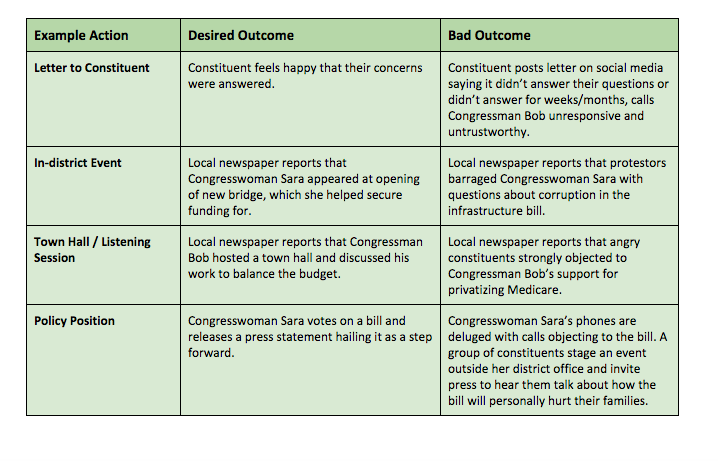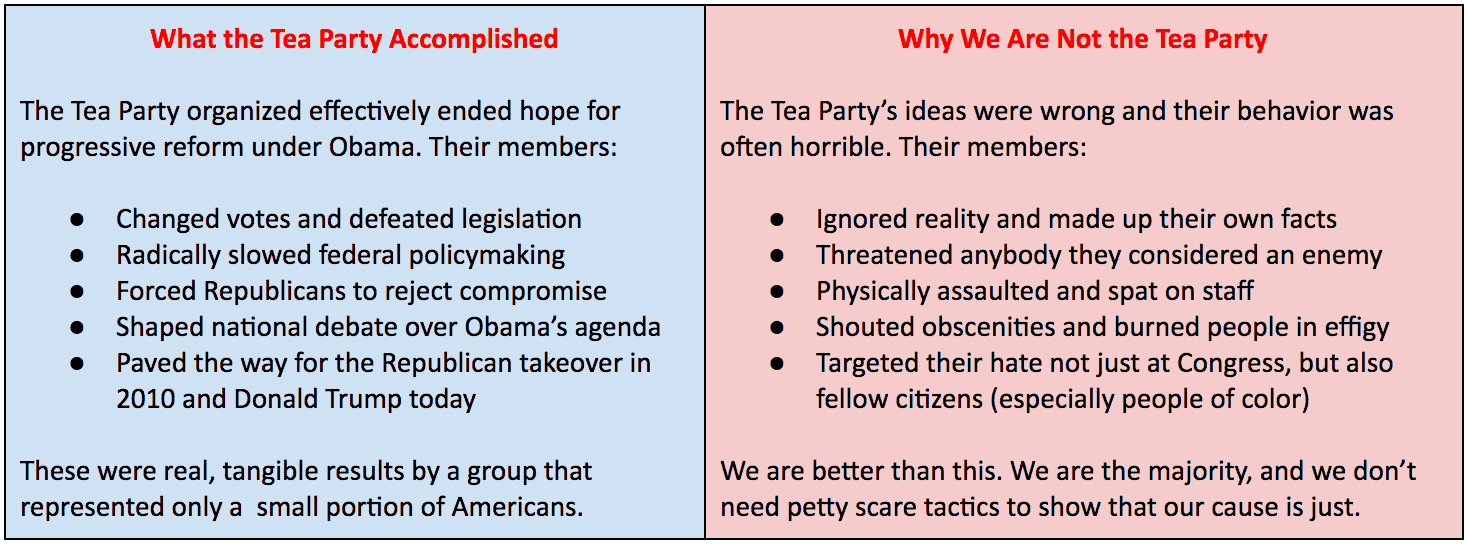In the aftermath of Donald Trump's election victory, progressives are drawing inspiration from an unlikely source — Tea Party activists.
In a widely circulated New York Times op-ed published December 14, Slate editor Dahlia Lithwick and law professor David S. Cohen urged Democrats to "fight like Republicans" to defeat elements of hate and authoritarianism in the movement propelling Trump.
"The Republicans in 2000 threw everything they could muster against the wall to see if it stuck, with no concern about potential blowback; the Democrats in 2016 are apparently too worried about being called sore losers," the authors wrote. They also said the passivity of the Democratic party made the prospect of the next four years "terrifying."
The very same day that op-ed was published, a group of progressives published a how-to guide on copying Republican tactics to claw back to power. The document, called "Indivisible: A Practical Guide for Resisting the Trump Agenda", was created over the Thanksgiving weekend. The guide, written by former congressional staff, spread like wildfire among progressives who viewed Trump as a threat to American democracy.
The guide's mostly anonymous authors know these strategies work, because they've observed their effectiveness up close when used by the Tea Party. Even though most of the authors prefer to remain unnamed, the group's unofficial spokespeople include Ezra Levin, a former staffer for Texas Democratic Rep. Lloyd Doggett, and Sarah Dohl, a former communications director who used to work with Levin at Doggett's office. As Levin said in an interview with Slate, anyone working for progressive members of Congress in 2009 or 2010 has a "personal story to tell about how the Tea Party affected them." Rep. Doggett's 2009 meetings on Obamacare were disrupted by activists shouting slogans and waving protest signs in his face.
The Tea Party is an organized group of political activists that formed following President Barack Obama's first election in 2008. It is known for promoting right-of-centre and populist views that have significantly shaped Republican policies in recent years.
The authors of the new progressive manifesto saw how a small but vocal minority could obstruct President Obama's agenda and pave the path for electoral victory by hard-right Republicans. In June 2014, Obama lamented that Republicans had blocked hundreds of bills since 2007, including jobs bills intended to help teachers and emergency response workers.
Alvaro Bedoya, founding executive director of the Georgetown Law Center on Privacy and Technology and former counsel to Senator Al Franken, praised the guide's clearly written strategy:
I spent 5 years on Capitol Hill. This is the best guide I've seen for affecting locally-driven change in Congress. https://t.co/yGdLGmuVZu
— Alvaro Bedoya (@alvarombedoya) December 19, 2016
Dohl, speaking on behalf of the progressive group, told National Observer how they hope the guide can be used:
"What we know is that even with a mandate and super-majority in Congress after the 2008 elections, the strategies of the Tea Party that we outlined in the guide unequivocally changed votes and defeated legislation, slowed policymaking, forced Republicans to reject compromise, shaped the national debate, and paved the way for Republican takeover in 2010," Dohl said.
"Using the Tea Party playbook, we are confident that progressives can stall the Trump agenda by forcing them to redirect energy away from their priorities; sap Representatives’ will to support or drive reactionary change; and, continue to reaffirm the illegitimacy of the Trump agenda."
She said that by "objecting as loudly and powerfully as possible, and by centering the voices of those who are most affected by their agenda," the movement can prepare ground for the 2018 midterm elections.
Effective tactics to promote change
The guide includes a range of ideas, such as organizing email lists, showing up in force at town halls and demanding answers to pressing questions. It urges activists to maximize visibility at public events, to be civil in order to win over critics, and to come well-prepared to speak to reporters.
The guide warns organizers that some groups of people can be more vulnerable than others, expressing concerns that visible minorities would be targeted by attacks from Trump supporters. The guide states that Members of Congress care deeply about endorsements from groups, and aren't as concerned about complaints coming from non-constituents and social media, unless these are generating news stories. The guide also advises activists to focus on a specific topic that personally affects them, rather than complaining about a Member of Congress' worldview or bombarding them with a laundry list of issues.

Graph from Indivisible Guide, page 10
The guide, mostly written for U.S. audiences, has won acclaim abroad as well. Dohl said the group has heard from Canadians "about how much they loved the guide as a resource and how they can adjust it to put it to use in their own local efforts."
We're not the Tea Party
One thing that the guide makes clear is that while it encourages progressives to adopt strategies inspired by the Tea Party, such as local-level organizing, it's discouraging people from copying Tea Party tactics such as physically threatening people and intimidating staff.
Screenshot from Indivisible guide
Dohl said the Tea Party's ideas were often wrong, and that its members' behaviour was "often horrible."
"We saw firsthand their members ignore reality and make up facts, threaten anyone they considered an enemy, and physically assault and spit on staff. We are better than this, and as the majority, we believe that we can win without petty scare tactics."
But while the new guide denounces violence, it's unapologetic about copying Republican tactics to obstruct the incoming president and pressure lawmakers who compromise to accommodate Trump's policies.
"You may not like the idea of being purely defensive; we certainly don’t," the guide reads. "But the hard truth of the next four years is that we’re not going to set the agenda...The best way to stand up for the progressive values and policies we cherish is to stand together, indivisible — to treat an attack on one as an attack on all."
Given the list of people on Trump's transition team, who include climate deniers like Myron Ebell, citizens need to stand together and defend their rights, Dohl said.
"I think that one must only look at the rhetoric of the Trump campaign, the people he's chosen to surround himself with...The American people have reason to be concerned on many fronts, and any number of people and decisions from the incoming Trump administration clearly illustrate why it's critical for the undisputed majority to roll up their sleeves and get to work to protect our values and what makes America great," Dohl said.
The Tea Party did not respond to a request for comment.
Thanks to Jenny Uechi and the
Thanks to Jenny Uechi and the National Observer for this interesting story. I was relieved to hear progressives are not adopting the horrible tactics of the tea party but only their strategies for getting the message across. I would like to remind you, in case it is not clear, that a descent into lies and hatred will not win anyone anything. In addition to being an abandoning of the very things you are supposedly working for, in a word "immoral", it will not accomplish the same ends because the media is mostly right-biased. They will readily point out any transgression in a way they do not with republicans/conservatives. Got it? I believe anyone of any party, once they have the information they need, will make the hopeful, compassionate, positive decision. It is a question of getting to them that information. Thank you National Observer for helping to do that. Sincerely, Hortense







Comments